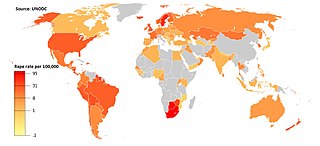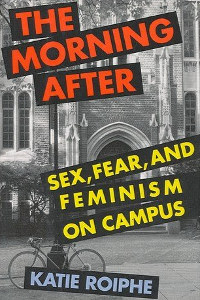A significant proportion of victims of rape or other sexual violence incidents are male. Historically, rape was thought to be, and defined as, a crime committed solely against women. This belief is still held in some parts of the world, but rape of males is now commonly criminalized and has been subject to more discussion than in the past.
John Stoltenberg is an American radical feminist activist, author, and magazine editor. He is the former managing editor of AARP The Magazine, a bimonthly publication of the United States-based advocacy group AARP, a position he held from 2004 until 2012.

Insight on the News was an American conservative print and online news magazine. It was owned by News World Communications, an international media conglomerate founded by Unification movement founder Sun Myung Moon, which at the time owned The Washington Times, United Press International, and several newspapers in Japan, South Korea, Africa, and South America. Insight's reporting sometimes resulted in journalistic controversy.
Sexual tension is a social phenomenon that occurs when two individuals interact and one or both feel sexual desire, but the consummation is postponed or never happens. A common scenario is where the two individuals function in proximity, such as co-workers or in a group of friends, but do not have sex to avoid awkwardness or for other reasons. Sexual tension doesn't have anything to do with the actual act of sex but is everything that leads up to it.

Commercial sexual exploitation of children (CSEC) is a commercial transaction that involves the sexual exploitation of a child, such as the prostitution of children, child pornography, and the sale and trafficking of children. CSEC may involve coercion and violence against children, economic exploitation, forced labour, contemporary slavery
Diana E. H. Russell is a feminist writer and activist. Born and raised in Cape Town, South Africa, she moved to England in 1957, and then to the United States in 1961. For the past 45 years she has been engaged in research on sexual violence against women and girls. She has written numerous books and articles on rape, including marital rape, femicide, incest, misogynist murders of women, and pornography. For The Secret Trauma, she was co-recipient of the 1986 C. Wright Mills Award. She was also the recipient of the 2001 Humanist Heroine Award from the American Humanist Association. She was also an organizer of the First International Tribunal on Crimes against Women, in Brussels in March 1976.

Rape culture is a sociological concept for a setting in which rape is pervasive and normalized due to societal attitudes about gender and sexuality. Behaviors commonly associated with rape culture include victim blaming, slut-shaming, sexual objectification, trivializing rape, denial of widespread rape, refusing to acknowledge the harm caused by sexual violence, or some combination of these. It has been used to describe and explain behavior within social groups, including prison rape and in conflict areas where war rape is used as psychological warfare. Entire societies have been alleged to be rape cultures.
Opposing Viewpoints is a series of books on current issues which seeks to explore the varying opinions in a balanced pros/cons debate. The series attempts to encourage critical thinking and issue awareness by providing opposing views on contentious issues. The online versions are handled by Cengage Gale, but the print versions are now available through Rosen publishing.
Terrorism: Opposing Viewpoints is a book, in the Opposing Viewpoints series, presenting selections of contrasting viewpoints on four central questions about terrorism: whether it is a serious threat; what motivates it; whether it can be justified; and how the United States should respond to it. It was edited by Laura K. Egendorf.

The Juventud Rebelde is a Cuban newspaper of the Unión de Jóvenes Comunistas.
Terrorism: Opposing Viewpoints is a book, in the Opposing Viewpoints series, presenting selections of contrasting viewpoints on four central questions about terrorism: whether it is a serious threat; what causes it; how America's domestic war on it should be conducted; and how the international community should respond to it. It was edited by Laura K. Egendorf.

The Morning After: Sex, Fear and Feminism on Campus is a 1993 book about date rape by author and journalist Katie Roiphe. Her first book, it was reprinted with a new introduction in 1994. Part of the book had previously been published as an essay, "The Rape Crisis, or 'Is Dating Dangerous?'" in the New York Times Magazine.
Christianity and domestic violence deals with the debate in Christian communities in relation to the recognition and response to domestic violence, which is complicated by a culture of silence and acceptance among abuse victims. There are some Bible verses that abusers use to justify discipline of their wives.
There are many different theories explaining the Causes of sexual violence. The theories that will be discussed in this article include military conquest, socioeconomics, anger, power, sadism, traits, ethical standards, laws, and evolutionary pressures that lend some explanation to the causes of sexual violence. Please note, most of the research on the causes of sexual violence has only been done on male offenders and is in no way fully developed.
Victimisation is the process of being victimised or becoming a victim. The field that studies the process, rates, incidence, effects, and prevalence of victimisation is called victimology.

Discussions of LGBTQ+ rights at the United Nations have included resolutions and joint statements in the United Nations General Assembly and the United Nations Human Rights Council (UNHRC), attention to the expert-led human rights mechanisms, as well as by the UN Agencies.

There exists a diversity of feminist views on prostitution. Many of these positions can be loosely arranged into an overarching standpoint that is generally either critical or supportive of prostitution and sex work.
Campus sexual assault is the sexual assault, including rape, of a student while attending an institution of higher learning, such as a college or university. The victims of such assaults are more frequently female, but any gender can be victimized. Estimates of sexual assault, which vary based on definitions and methodology, generally find that somewhere between 19–27% of college women and 6–8% of college men are sexually assaulted during their time in college.
Feminist views on BDSM vary widely from acceptance to rejection. BDSM refers to bondage and discipline, dominance and submission, and Sado-Masochism. In order to evaluate its perception, two polarizing frameworks are compared. Some feminists, such as Gayle Rubin and Patrick Califia, perceive BDSM as a valid form of expression of female sexuality, while other feminists, such as Andrea Dworkin and Susan Griffin, have stated that they regard BDSM as a form of woman-hating violence. Some lesbian feminists practice BDSM and regard it as part of their sexual identity.

Carol Stabile is a professor in the department of Women’s Studies at the University of Maryland, College Park.








